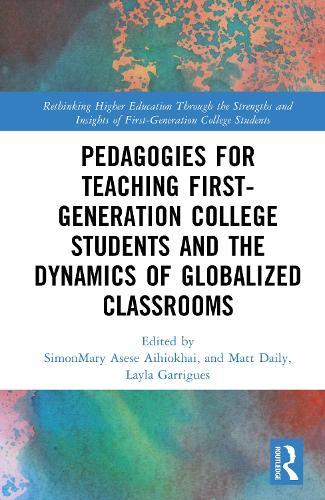Overview
This book examines how higher education institutions positively enhance the learning experiences of first-generation college students. What systems in our communities and world are intentionally or unintentionally producing the realities of first-generation identities, and how can these be upended through a deliberate pedagogical turn? With these questions in mind, this book aims to highlight the relevant and dynamic pedagogical skills and tools that institutions can employ to address the demands of globality and difference in the classroom. Challenging traditional deficit-focused perspectives used to discuss first-generation students, the book highlights alternative strengths-based support methods to improve the experiences and outcomes of first-generation college students. This book will appeal to scholars, researchers, and upper-level students with interests in higher education, cultural studies, philosophy of education, and decolonial studies.
Full Product Details
Author: SimonMary Asese Aihiokhai (University of Portland, USA) ,
Matt Daily (Idaho State University, USA) ,
Layla Garrigues (University of Portland, USA)
Publisher: Taylor & Francis Ltd
Imprint: Routledge
Weight: 0.630kg
ISBN: 9781032958538
ISBN 10: 1032958537
Pages: 226
Publication Date: 23 September 2025
Audience:
College/higher education
,
Professional and scholarly
,
Tertiary & Higher Education
,
Professional & Vocational
Format: Hardback
Publisher's Status: Forthcoming
Availability: Not yet available

This item is yet to be released. You can pre-order this item and we will dispatch it to you upon its release.
Reviews
Reimagining higher education as a collaborative, inclusive space where belonging and strengths-based support drive institutional growth and student success, this groundbreaking anthology offers innovative pedagogies for globalized classrooms. An essential resource, it celebrates the insights and transformative potential of first-generation college students, inspiring meaningful change in teaching and learning, John Watzke, Ph.D., Dean and Professor of the School of Education and Graduate School, University of Portland Taken together, these essays demonstrate a profound maturing of thought, first opened generations earlier by Paulo Freire and global collaborators in the immediate postcolonial era. In a dramatically different time marked by the post-pandemic reaction to globalization and diversity, we now have targeted strategies and deep theoretical grounding critical for a future where higher education can continue to thrive and grow by welcoming those who have all too often been actively unwelcomed in higher education. The net result will not only transform higher education but the societies of which they are a part. Highly recommended for all interested in innovative approaches to pedagogy in higher education that bring in learning strategies for first generation students. Such skills and approaches as the African palaver pedagogy, promise to ultimately serve all throughout the global enterprise that is higher education today., Bryan Froehle, professor and director of the Ph.D. in practical theology, Palm Beach Atlantic University and co-author of Global Catholicism: Between Disruption and Encounter (Brill, 2025). This volume masterfully infuses the conversation surrounding first-generation (FGEN) college students with a much-needed asset-based framing. Dr. Aihiokhai and his team make a significant contribution by broadening the discourse around FGEN students to include a global perspective. Readers will find liberation in three critical areas: first, challenging the perception of FGEN students as deficient in their abilities and knowledge of the world; second, overcoming the narrow, U.S.-centric framing that has historically dominated discussions about first-gen experiences; and third, recognizing the urgent need to be informed and cultivate globalized spaces for learning., Dr. Byron R. Martin, Ph.D., is the Founder and CEO of Outlast Learning & Service, he guides educational institutions, nonprofits, and corporations in strategic DEI assessments, planning, and training
Reimagining higher education as a collaborative, inclusive space where belonging and strengths-based support drive institutional growth and student success, this groundbreaking anthology offers innovative pedagogies for globalized classrooms. An essential resource, it celebrates the insights and transformative potential of first-generation college students, inspiring meaningful change in teaching and learning. John Watzke, Ph.D., Dean and Professor of the School of Education and Graduate School, University of Portland Taken together, these essays demonstrate a profound maturing of thought, first opened generations earlier by Paulo Freire and global collaborators in the immediate postcolonial era. In a dramatically different time marked by the post-pandemic reaction to globalization and diversity, we now have targeted strategies and deep theoretical grounding critical for a future where higher education can continue to thrive and grow by welcoming those who have all too often been actively unwelcomed in higher education. The net result will not only transform higher education but the societies of which they are a part. Highly recommended for all interested in innovative approaches to pedagogy in higher education that bring in learning strategies for first-generation students. Skills and approaches, such as the African Palaver pedagogy, promise to ultimately serve all throughout the global enterprise that is higher education today. Bryan Froehle, professor and director of the Ph.D. in practical theology, Palm Beach Atlantic University and co-author of Global Catholicism: Between Disruption and Encounter (Brill, 2025) This volume masterfully infuses the conversation surrounding first-generation (FGEN) college students with a much-needed asset-based framing. Dr. Aihiokhai and his team make a significant contribution by broadening the discourse around FGEN students to include a global perspective. Readers will find liberation in three critical areas: first, challenging the perception of FGEN students as deficient in their abilities and knowledge of the world; second, overcoming the narrow, US-centric framing that has historically dominated discussions about first-gen experiences; and third, recognizing the urgent need to be informed and cultivate globalized spaces for learning. Byron R. Martin, Ph.D., is the Founder and CEO of Outlast Learning & Service
Author Information
SimonMary Asese Aihiokhai is Professor of Theology and Religious Studies, and affiliate faculty of Ethnic Studies at the University of Portland, USA Matt Daily is Assistant Vice President and Dean of Students at Idaho State University, USA. Layla Garrigues is Associate Professor, School of Nursing and Health Innovations at the University of Portland, USA.



